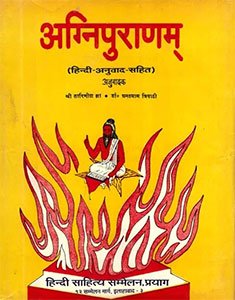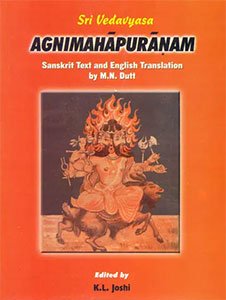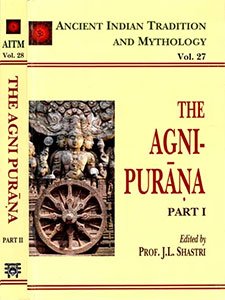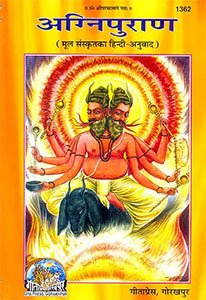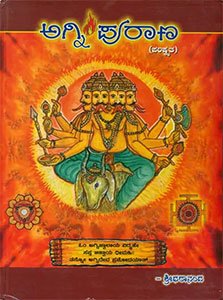Agni Purana [sanskrit]
97,288 words
This Sanskrit edition of the Agnipurana. It is one of the traditional eighteen Mahapuranas presented as an encyclopedia of ancient Indian history and knowledge. It contains either 382 or 383 chapters and over 10.000 verses (Sanskrit Shlokas).
Verse 323.7
ओं हले शूले एहि ब्रह्मसत्येन विष्णुसत्येन रुद्रसत्येन रक्ष मां वाचेश्वराय स्वाहा ।
दुर्गात्तारयते यस्मात्तेन दुर्गा शिवा मता ।
ओं चण्डकपालिनि दन्तान् किटि क्षिटि गुह्ये फट् ह्रीँ ।
अनेन मन्त्रराजेन क्षालयित्वा तु तण्डुलान् ॥ ७ ॥
oṃ hale śūle ehi brahmasatyena viṣṇusatyena rudrasatyena rakṣa māṃ vāceśvarāya svāhā |
durgāttārayate yasmāttena durgā śivā matā |
oṃ caṇḍakapālini dantān kiṭi kṣiṭi guhye phaṭ hrīṃ |
anena mantrarājena kṣālayitvā tu taṇḍulān || 7 ||
The Sanskrit text of Verse 323.7 is contained in the book The Agni Puranam (Anandashram Edition) by Shri Chimna Apate (श्री चिमणा आपटे). This book is available online or you could buy the latest edition:
Read online Buy now! The Sanskrit text by Shri Chimna Apate (श्री चिमणा आपटे) (1987)
Glossary of Sanskrit terms
Note: This extracts Sanskrit terms and links to English definitions from the glossary, based on an experimental segmentation of verse (323.7). Some terms could be superfluous while some might not be mentioned. Click on the word to show English definitions.
Hal, Hala, Hali, Shula, Shuli, Brahmasati, Satya, Rudra, Raksha, Asmad, Vaca, Vac, Ishvara, Svaha, Durga, Tarayat, Yasmat, Yah, Yat, Tad, Tena, Shiva, Mata, Candaka, Palin, Palini, Danta, Guhya, Guhi, Phat, Hrim, Ana, Anena, Idam, Mantraraja, Tandula,
Analysis of Sanskrit grammar
Note: this is an experimental feature and only shows the first possible analysis of the Sanskrit text (Verse 323.7). If the system was successful in segmenting the sentence, you will see of which words it is made up of, generally consisting of Nouns, Pronouns, Verbs, Participles and Indeclinables. Click on the link to show all possible derivations of the word.
- Line 1: “oṃ hale śūle ehi brahmasatyena viṣṇusatyena rudrasatyena rakṣa māṃ vāceśvarāya svāhā ”
- Cannot analyse om*ha
- hale -
-
hal (noun, masculine)[dative single]hala (noun, masculine)[locative single]hala (noun, neuter)[nominative dual], [vocative dual], [accusative dual], [locative single]halā (noun, feminine)[nominative dual], [vocative single], [vocative dual], [accusative dual]hali (noun, masculine)[vocative single]√hal (verb class 1)[present middle first single]
- śūle -
-
śūla (noun, masculine)[locative single]śūla (noun, neuter)[nominative dual], [vocative dual], [accusative dual], [locative single]śūlā (noun, feminine)[nominative dual], [vocative single], [vocative dual], [accusative dual]śūli (noun, masculine)[vocative single]śūli (noun, feminine)[vocative single]√śūl (verb class 1)[present middle first single]
- ehi -
-
ehi (noun, masculine)[compound], [adverb]
- brahmasatye -
-
brahmasatī (noun, feminine)[compound], [adverb], [nominative single], [vocative single]
- ena -
-
a (noun, masculine)[instrumental single]
- viṣṇu -
-
viṣṇu (noun, feminine)[compound], [adverb]viṣṇu (noun, masculine)[compound], [adverb]
- satyena -
-
satya (noun, masculine)[instrumental single]satya (noun, neuter)[instrumental single]
- rudra -
-
rudra (noun, masculine)[compound], [vocative single]rudra (noun, neuter)[compound], [vocative single]
- satyena -
-
satya (noun, masculine)[instrumental single]satya (noun, neuter)[instrumental single]
- rakṣa -
-
rakṣa (noun, masculine)[compound], [vocative single]rakṣa (noun, neuter)[compound], [vocative single]√rakṣ (verb class 1)[imperative active second single]
- mām -
-
mā (noun, feminine)[accusative single]asmad (pronoun, none)[accusative single]
- vāce -
-
vācā (indeclinable adverb)[indeclinable adverb]vāca (noun, masculine)[compound], [vocative single], [locative single]vāc (noun, feminine)[instrumental single], [dative single]vācā (noun, feminine)[nominative single], [nominative dual], [vocative single], [vocative dual], [accusative dual]
- iśvarāya -
-
iśvara (noun, masculine)[dative single]iśvara (noun, neuter)[dative single]
- svāhā -
-
svāhā (indeclinable)[indeclinable]svāhā (noun, feminine)[nominative single]
- Line 2: “durgāttārayate yasmāttena durgā śivā matā ”
- durgāt -
-
durga (noun, masculine)[adverb], [ablative single]durga (noun, neuter)[adverb], [ablative single]
- tārayate -
-
√tṝ -> tārayat (participle, masculine)[dative single from √tṝ]√tṝ -> tārayat (participle, neuter)[dative single from √tṝ]√tṝ (verb class 0)[present middle third single]
- yasmāt -
-
yasmāt (indeclinable)[indeclinable]ya (noun, masculine)[ablative single]yaḥ (pronoun, masculine)[ablative single]yat (pronoun, neuter)[ablative single]
- tena -
-
tena (noun, masculine)[compound], [vocative single]ta (noun, masculine)[instrumental single]ta (noun, neuter)[instrumental single]tad (noun, neuter)[instrumental single]sa (noun, masculine)[instrumental single]√tan (verb class 8)[perfect active second plural]√tan (verb class 4)[perfect active second plural]√tan (verb class 1)[perfect active second plural]
- durgā -
-
durgā (noun, feminine)[nominative single]
- śivā* -
-
śiva (noun, masculine)[nominative plural], [vocative plural]śivā (noun, feminine)[nominative plural], [vocative plural], [accusative plural]
- matā -
-
matā (noun, feminine)[nominative single]√man -> matā (participle, feminine)[nominative single from √man class 4 verb], [nominative single from √man class 8 verb]
- Line 3: “oṃ caṇḍakapālini dantān kiṭi kṣiṭi guhye phaṭ hrīṃ ”
- Cannot analyse om*ca
- caṇḍaka -
-
caṇḍaka (noun, masculine)[compound], [vocative single]caṇḍaka (noun, neuter)[compound], [vocative single]
- pālini -
-
pālinī (noun, feminine)[adverb], [vocative single]pālin (noun, masculine)[locative single]pālin (noun, neuter)[locative single]
- dantān -
-
danta (noun, masculine)[accusative plural]
- kiṭi -
-
kiṭi (noun, masculine)[compound], [adverb]
- Cannot analyse kṣiṭi*gu
- guhye -
-
guhya (noun, masculine)[locative single]guhya (noun, neuter)[nominative dual], [vocative dual], [accusative dual], [locative single]guhyā (noun, feminine)[nominative dual], [vocative single], [vocative dual], [accusative dual]√guh -> guhya (participle, masculine)[locative single from √guh class 1 verb]√guh -> guhya (participle, neuter)[nominative dual from √guh class 1 verb], [vocative dual from √guh class 1 verb], [accusative dual from √guh class 1 verb], [locative single from √guh class 1 verb]√guh -> guhyā (participle, feminine)[nominative dual from √guh class 1 verb], [vocative single from √guh class 1 verb], [vocative dual from √guh class 1 verb], [accusative dual from √guh class 1 verb]guhī (noun, masculine)[dative single]√guh (verb class 1)[present passive first single]
- phaṭ -
-
phaṭ (indeclinable)[indeclinable]
- hrīm -
-
hrīm (indeclinable)[indeclinable]
- Line 4: “anena mantrarājena kṣālayitvā tu taṇḍulān ”
- anena -
-
anena (noun, masculine)[compound], [vocative single]anena (noun, neuter)[compound], [vocative single]ana (noun, masculine)[instrumental single]idam (pronoun, masculine)[instrumental single]idam (pronoun, neuter)[instrumental single]
- mantrarājena -
-
mantrarāja (noun, masculine)[instrumental single]
- Cannot analyse kṣālayitvā*tu
- tu -
-
tu (indeclinable particle)[indeclinable particle]
- taṇḍulān -
-
taṇḍula (noun, masculine)[accusative plural]
Other editions:
Also see the following editions of the Sanskrit text or (alternative) English translations of the Verse 323.7
Agni Purana with Hindi Translation
by Tarinish Jha and Dr. Ghanshayam Tripathi (तारिणीश् झा और डॉ. घनश्याम त्रिपाठी) (2007)
Publisher: Hindi Sahitya Sammelan, Allahabad; 1199 pages; Title: अग्निपुराणम् (संस्कृत एवं हिन्दी अनुवाद);
Buy now!
Agni Purana (Two Volumes)
by M. N. Dutt (2023)
Publisher: Parimal Publication Pvt. Ltd.; Editor: K. L. Joshi.; ISBN-10: 8171101690; ISBN-13: 9788171101696; 1070 pages.
Buy now!
Agni-Purana (Set of 4 Volumes)
by N. Gangadharan (2006)
Publisher: Motilal Banarsidass Publishers Pvt. Ltd.; ISBN: Part I 8120803590 (9788120803596); Part II 8120803604 (9788120803602); Part III 8120801741 (9788120801745); Part IV 812080306X (9788120803060); 1271 pages.
Buy now!
The Agni Purana (Hindi)
by (2013)
Publisher: Gita Press, Gorakhpur; Title: अग्निपुराण (केवल हिन्दी अनुवाद); ISBN-10: 8129302934; ISBN-13: 9788129302939; 848 pages.
Buy now!
Agni Purana (Kannada)
by Sreedharananda (2013)
Publisher: Pooja Pusthaka Bhandara, Bangalore; Title: ಅಗ್ನಿ ಪುರಾಣ; 560 pages.
Buy now!Preview of verse 323.7 in Kannada sript:
ಓಂ ಹಲೇ ಶೂಲೇ ಏಹಿ ಬ್ರಹ್ಮಸತ್ಯೇನ ವಿಷ್ಣುಸತ್ಯೇನ ರುದ್ರಸತ್ಯೇನ ರಕ್ಷ ಮಾಂ ವಾಚೇಶ್ವರಾಯ ಸ್ವಾಹಾ ।
ದುರ್ಗಾತ್ತಾರಯತೇ ಯಸ್ಮಾತ್ತೇನ ದುರ್ಗಾ ಶಿವಾ ಮತಾ ।
ಓಂ ಚಣ್ಡಕಪಾಲಿನಿ ದನ್ತಾನ್ ಕಿಟಿ ಕ್ಷಿಟಿ ಗುಹ್ಯೇ ಫಟ್ ಹ್ರೀಂ ।
ಅನೇನ ಮನ್ತ್ರರಾಜೇನ ಕ್ಷಾಲಯಿತ್ವಾ ತು ತಣ್ಡುಲಾನ್ ॥ ೭ ॥
![Agni Purana [sanskrit] - book cover](/uploads/a/Agni-Purana-Sanskrit.jpg)
